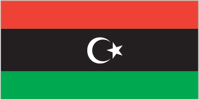Compare
Vatican City
to
Libyato
LibyaVatican City is a city-state within Italy and the seat of Roman Catholicism
There's really just not enough data on Vatican City to relate it to other countries, so we're just having some fun here.
 With its 6,244,174 people, Libya is the
107th largest country in the world by
population. It is the 17th largest country in the
world by area with 1,759,540 square kilometers.
With its 6,244,174 people, Libya is the
107th largest country in the world by
population. It is the 17th largest country in the
world by area with 1,759,540 square kilometers.
The Italians supplanted the Ottoman Turks in the area around Tripoli in 1911 and did not relinquish their hold until 1943 when defeated in World War II. Libya then passed to UN administration and achieved independence in 1951. Following a 1969 military coup, Col. Muammar al-QADHAFI assumed leadership and began to espouse his political system at home, which was a combination of socialism and Islam. During the 1970s, QADHAFI used oil revenues to promote his ideology outside Libya, supporting subversive and terrorist activities that included the downing of two airliners - one over Scotland, another in Northern Africa - and a discotheque bombing in Berlin. UN sanctions in 1992 isolated QADHAFI politically and economically following the attacks; sanctions were lifted in 2003 following Libyan acceptance of responsibility for the bombings and agreement to claimant compensation. QADHAFI also agreed to end Libya's program to develop weapons of mass destruction, and he made significant strides in normalizing relations with Western nations. Unrest that began in several Middle Eastern and North African countries in late 2010 erupted in Libyan cities in early 2011. QADHAFI's brutal crackdown on protesters spawned a civil war that triggered UN authorization of air and naval intervention by the international community. After months of seesaw fighting between government and opposition forces, the QADHAFI regime was toppled in mid-2011 and replaced by a transitional government. Libya in 2012 formed a new parliament and elected a new prime minister.
Check out the recommended reading list below for great sources of information on Libya